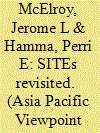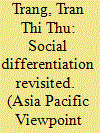|
|
|
Sort Order |
|
|
|
Items / Page
|
|
|
|
|
|
|
| Srl | Item |
| 1 |
ID:
095584


|
|
|
|
|
| Publication |
2010.
|
| Summary/Abstract |
This paper will explore social change in contemporary Samoan society with respect to the traditional expectations of the church and kinship conflicting with the modern needs of an urbanising population. In the Samoan way of life - the fa'aSamoa - religion, matai (chiefly system) and reciprocal 'gift-giving' kinship arrangements among the aiga (extended family) are fundamental and closely related elements. However, pressures from continued integration into the global economy, the importance of remittance income and related migration of well-educated and highly skilled Samoans overseas are presenting several challenges to the strongly held traditions of kinship and church obligations. Among these challenges, low-income households are increasingly placing the material well-being of the immediate household first, thus 'opting out' of the culturally defined primary obligation to the church and risk alienation from beneficial familial ties. As a result, settlement patterns are shifting towards leaseholds in urbanising Apia, with consequences, we will speculate, that may have deeper cultural implications. Our research revealed that the church has been slow to accept that, increasingly, Samoans are seeking relief from hardships that spirituality alone cannot address. However, given its influence, strengths and resources, the church is well positioned to take a lead role in facilitating opportunities for 'bottom-up', alternative development in Samoa, as well as providing lessons for church-led participatory approaches in the Pacific Island Region.
|
|
|
|
|
|
|
|
|
|
|
|
|
|
|
|
| 2 |
ID:
095592


|
|
|
|
|
| Publication |
2010.
|
| Summary/Abstract |
This study examines knowledge-based urban development in Beijing with the objective of revealing the impact of the 'synergetic' forces of globalisation and local government intervention on knowledge-based urban development in the context of the coexisting processes of globalisation and decentralisation. The findings in this paper show that due to the rapid growth of the cultural industry sector, knowledge-based urban development has created various kinds of 'cultural industry clustered areas', which were recently promoted by the 2008 Olympic Games. 'Synergetic' global and local forces are leading knowledge-based urban development, with the emergence of a local coalition regime in which local government manages local development, considered as 'enterprises' in the decentralisation process, while the State retains a significant influence on knowledge-based urban development. The central and municipal governments tend to emphasise strategies to 'facilitate the climate for growth' rather than the centrally planned control they exerted prior to the 1980s.
|
|
|
|
|
|
|
|
|
|
|
|
|
|
|
|
| 3 |
ID:
095594


|
|
|
|
|
| Publication |
2010.
|
| Summary/Abstract |
This article provides a comparative investigation of education programmes intended to revitalise te reo (the language of the M?ori, indigenous to Aotearoa New Zealand) and Mapudungun (the language of the Mapuche, indigenous to Chile), respectively. The historical processes of colonisation and globalisation in Chile and Aotearoa New Zealand that have threatened indigenous language are outlined, and revitalisation efforts subsequently described and assessed. Finally, the disparities in success that the two countries have experienced in their revitalisation efforts are examined, and some recommendations made.
|
|
|
|
|
|
|
|
|
|
|
|
|
|
|
|
| 4 |
ID:
095595


|
|
|
|
|
| Publication |
2010.
|
| Summary/Abstract |
Industry outsourcing has become a significant feature of industrialisation in Southeast Asia. This study presents the findings of a study of smaller industrial enterprises in Northeast Thailand that outsource some of their operations to workers in rural villages. It was found that social relationships rather than formal contracts are critical in the management and spread of such outsourcing and that industries use outsourcing primarily as a flexible strategy to lower costs of production.
|
|
|
|
|
|
|
|
|
|
|
|
|
|
|
|
| 5 |
ID:
095590


|
|
|
|
|
| Publication |
2010.
|
| Summary/Abstract |
This paper explores the relationship between beers and island development, using a global sweep but with a special reference to the insular Pacific. It adopts a discriminatory approach, touching upon the role and impact that niche and bouquet beer manufacturing can have on the socioeconomic development of small islands. It departs from a personal observation: many small island jurisdictions have their own brewery. Indeed, the brewery could also be the island territory's largest indigenous manufacturing concern. While small islands are associated with low manufacturing capacity and diseconomies of scale, nevertheless 'a local brewery' comes across, in many cases, as a profitable and glaring exception that speaks to the attractions and virtues of locality branding.
|
|
|
|
|
|
|
|
|
|
|
|
|
|
|
|
| 6 |
ID:
095587


|
|
|
|
|
| Publication |
2010.
|
| Summary/Abstract |
This study attempts to do three things: (i) provide a review of recent advances in the small island economy literature using the tourism penetration index, (ii) update the impact of tourism across the same global sample of 36 small islands (less than 1 million in population and 5000 km2 in area) introduced in APV 47 (1) 2006, and (iii) employing an abbreviated version of the destination life cycle as a development paradigm, construct three different socioeconomic and demographic profiles based on low, intermediate and high tourism impact. Results using cross-sectional data of 27 indicators reveal three statistically distinct profiles that demonstrate three stages of economic development. Specifically, the findings contrast the low-income, labour-exporting, least tourism-penetrated MIRAB-type (Migrant/Remittances and Aid/Bureaucracy) emerging islands with their more advanced intermediate impact neighbours. In turn, the latter fall at a significant distance from the most successful small island tourist economy (SITE) destinations. Thus, this study further refines the characteristics of SITE islands and confirms the viability of tourism in general and the destination life cycle in particular as an effective engine and model, respectively, of island development.
|
|
|
|
|
|
|
|
|
|
|
|
|
|
|
|
| 7 |
ID:
095585


|
|
|
|
|
| Publication |
2010.
|
| Summary/Abstract |
This article analyses the processes of transformation and differentiation since the 1950s in a Vietnamese rural village, hereafter called Chieng Hoa.1 It examines how radical changes in political discourse and economic policies at the national level have affected the welfare and social relations of villagers and how the latter have in turn coped, resisted, as well as shaped such structural changes. Using concrete life stories of local people, the article identifies the winners and losers in this transformation process, the trajectories households or individuals have taken to arrive at their current positions, and the strategies that they are adopting for the future. It demonstrates that differentiation in Chieng Hoa implies changes in social relations, including but not limited to relations of production, and that even within this single locality, differentiation can take various forms and processes over time, whether specific to or cutting across changes in macro-policies. The article also reveals that in the often perceived equal collectivisation, inequalities still existed and became causes of differentiation in the subsequent decollectivisation period. However, while conditions for a permanent differentiation were present, such process has failed to materialise in the current integration period. Differentiation has become more unpredictable as past winners can lose out due to unstable market conditions.
|
|
|
|
|
|
|
|
|
|
|
|
|
|
|
|
| 8 |
ID:
095588


|
|
|
|
|
| Publication |
2010.
|
| Summary/Abstract |
Disappearing islands and climate refugees have become signifiers of the scale and urgency of uneven impacts of climate change. This paper offers a critical account of how sea level rise debates reverberate around Western mythologies of island laboratories. I argue that representations of low-lying Oceania islands as experimental spaces burden these sites with providing proof of a global climate change crisis. The emergence of Tuvalu as a climate change 'canary' has inscribed its islands as a location where developed world anxieties about global climate change are articulated. As Tuvalu islands and Tuvaluan bodies become sites to concretize climate science's statistical abstractions, they can enforce an eco-colonial gaze on Tuvalu and its inhabitants. Expressions of 'wishful sinking' create a problematic moral geography in some prominent environmentalist narratives: only after they disappear are the islands useful as an absolute truth of the urgency of climate change, and thus a prompt to save the rest of the planet.
|
|
|
|
|
|
|
|
|
|
|
|
|
|
|
|
|
|
|
|
|